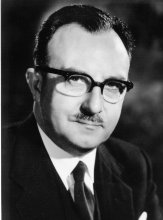William McCrea (astronomer) facts for kids
Sir William Hunter McCrea (born December 13, 1904 – died April 25, 1999) was a brilliant English astronomer and mathematician. He made important discoveries about stars and the universe. He was also a respected member of top scientific groups, like the Royal Society of London.
Contents
Who Was Sir William McCrea?
Sir William McCrea was born in Dublin, Ireland, on December 13, 1904. His family moved to England when he was young. First they lived in Kent, then in Derbyshire.
His Early Life and Education
William went to Chesterfield Grammar School. His father was a teacher at another school nearby. In 1923, William went to Trinity College, Cambridge to study Mathematics. He earned his PhD in 1929.
His Career in Science
After finishing his studies, William McCrea started teaching.
- In 1930, he became a Mathematics lecturer at the University of Edinburgh in Scotland.
- While in Edinburgh, he was chosen to be a Fellow of the Royal Society of Edinburgh. This is a special honor for top scientists.
- He won the Keith Medal for his excellent work in science.
- In 1932, he moved to Imperial College London to teach.
- By 1936, he was a Professor of Mathematics and led the math department at the Queen's University of Belfast.
McCrea During Wartime and Later Years
During the Second World War, Sir William helped the British Navy with important research. After the war, in 1944, he joined the mathematics department at Royal Holloway College. A building on their campus is even named after him! In 1952, he became a Fellow of the Royal Society of London, which is one of the highest honors for scientists in the UK.
In 1965, Sir William McCrea helped create the astronomy center at the University of Sussex. He passed away on April 25, 1999, in Lewes, Sussex.
What Did Sir William McCrea Discover?
Sir William McCrea made some very important discoveries about stars and how they work.
The Sun's Secret Ingredients
In 1928, he studied ideas from another scientist, Albrecht Unsöld. McCrea found that about three-quarters (75%) of the Sun is made of hydrogen. He also found that about one-quarter (25%) is helium. Only about 1% is made of other elements. Before this, many people thought the Sun was mostly made of iron! His discovery helped scientists understand that most stars are mainly made of hydrogen.
Understanding Blue Straggler Stars
In 1964, he suggested a way to explain blue straggler stars. These are stars that seem to be younger and hotter than they should be, based on where they are in star clusters. McCrea proposed that they get their extra energy by "stealing" mass from other stars nearby. This idea is called a mass transfer mechanism.
Awards and Honors
Sir William McCrea received many awards and honors for his scientific work.
- He was the president of the Royal Astronomical Society from 1961 to 1963.
- He also led a section of the British Association for the Advancement of Science from 1965 to 1966.
- In 1976, he won the Gold Medal of the Royal Astronomical Society. This is a very prestigious award for astronomers.
- In 1985, Queen Elizabeth II made him a knight, so he became "Sir" William McCrea.
Images for kids
 | Isaac Myers |
 | D. Hamilton Jackson |
 | A. Philip Randolph |



